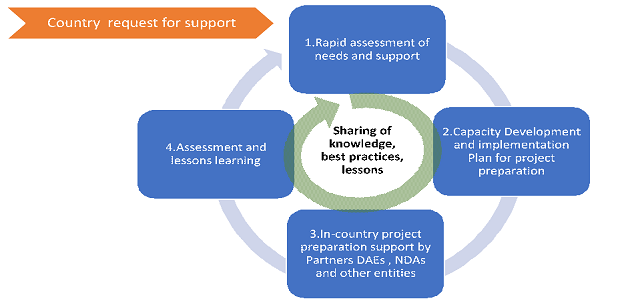- Formal request for support from the country submitted online through the web portal of the Project Preparation Partnership for GCF Water Investments in Africa
- Rapid assessment of the needs for support. The assessment involves analyzing current needs specific to identifying, prioritizing, preparing, or financing climate resilient GCF projects in water and related sectors, followed by evaluation of potential and priority areas of support.
- The Partnership identifies potential support or resources from among its member institutions including DEAs from other countries
- Capacity Development Plan developed by the Partnership. On the basis of prioritized needs, available resources, and support committed by member institutions, the Partnership will design a project capacity development plan. For countries requesting Partnership support on multiple projects, discrete project capacity development plans will be accompanied by an overarching programmatic in-country capacity development plan to harness synergies, take advantage of economies of scale, and capitalize on strengthened, embedded in-country capacity.
- Capacity development implemented through hands-on project preparation support including training in key priority areas defined
- Project concept notes submitted by country to GCF for integrity checks and vetting
- Countries develop full proposal with assistance from members of the Partnership or any other GCF accredited entity nominated by the NDA
- Lessons learned on preparing successful GCF water projects through both project-specific and programmatic in-country support will be harvested by the Partnership to inform engagement – in-country, and among countries across Africa – in a dynamic manner.
Across all steps, the Partnership fosters horizontal sharing of knowledge, best practices, and lessons to allow rapid adaption to in-country context and application to specific water projects. Knowledge packaging, sharing, and application will be done in ways suited to the on-the-ground reality in Africa, cognizant of the local political-economic context, existing technical expertise, and available administrative capabilities.


